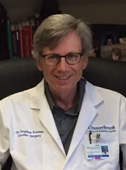Steven Fremes
Appointed to a Second
Five Year Term as the Dr.
Bernard Goldman Chair
in Cardiac Surgery

Steve Fremes
|
In his successful 5 year
review of his first term as
the Bernard Goldman
Chair of Cardiac Surgery
at Sunnybrook, Stephen
Fremes described himself as
a clinician researcher, rather
than a clinician scientist,
illustrating his clinical studies
on arterial revascularization
to improve coronary
bypass patency. His emphasis
is on active practice. Following initial studies with
Richard Weisel on myocardial protection, his international
reputation grew based on studies on grafts to revascularize
the coronary circulation. He is proudest of the recent
guidelines issued by the Society of Thoracic Surgery. In
contrast to the earlier guidelines by the American Heart
Association, the American College of Cardiology and the
European organizations, the STS elevated radial artery
revascularization to a class 1 indication. This was a culmination
of his recent studies, now in press.
Steve has also worked myocardial protection using
Levosimendam, an FDA approved industry-funded
study. 20% of the sites for this study are in Canada,
where the recruiting has been excellent. Steve is the
national lead for this study which will be presented at the
American College of Cardiology meeting in spring 2017.
He is also at the transition from a pilot to a large
study of selenium as an antioxidant in the repair pathway
for the prevention of major organ injury following
higher risk cardiac surgery. Non-randomized clinical
studies have been positive and the pre-clinical studies
very promising. The pilot study has been completed and
training is under way at the sites that will begin entering
patients in the fall. Selenium levels fall after cardiac
surgery, a promising lead. There may also be a dietary
factor. Germany and Canada are the two countries that
will recruit patients for the selenium study.
The third theme of his clinical research has been minimally
invasive cardiac surgery. TAVI (transarterial valve
implantation) is the principal focus. “We were early adopters
and are now the 2nd or 3rd largest centre in Canada
performing TAVI, after Vancouver and Quebec City. The
research is collaborative. Dr. Shyam Radhakrishnan and
Dr. Harindra Wijeysundera are very active in this work. We
have currently completed enrollment into a moderate risk
(in contradistinction to inoperable or high operative risk)
aortic valve disease patients. We were the top Canadian
recruiter in the randomized trial. There are now 2 low risk
cohort, i.e. less than 3% predicted operative mortality, studies
approved ; the studies are only operational in the US at
the present time, but will eventually be opened in Canada.”
The take- home message is that TAVI is very effective
in high risk patients and adequate in moderate risk
patients. An important question is about long term valve
durability and it will take lower risk data to address this.
The higher risk patients who have been primarily treated
so far, cannot be counted on to answer this question as
the patients’ longevity is limited because of advanced age
and co-morbidities. There is currently equipoise for low
risk patients. The youngest patients who have bicuspid
valve disease are being treated by TAVI off label. This is
probably too big a step at this point in time, as these are
very low risk patients for open surgery and probably will
not be improved by a catheter - based intervention.
|
“I’ve had excellent research fellows, typically from the
Surgeon-Scientist program but also including international
post-doctoral MDs. Currently, Saswata (Sas) Deb
is in his 5th year. He is a PhD student with multiple
awards. He will complete his PhD in this academic year.
Derrick Tam is joining me in July, focusing his work
on aortic stenosis, and Reena Karkhanis, who has been
working with me as a research assistant will be starting
as an MSc. The Schulich Cardiac Program has embraced
the less invasive approach to heart disease including the
TAVI work, but also the Mitral Program with Gideon
and Eric Cohen in the lead, and less invasive CABG
(Coronary Artery Bypass Graft Surgery) with Dr. Fuad
Moussa (surgery), doing hybrid revascularization.
“EVAR has flipped vascular surgery into the catheter
based minimally invasive category. The change has not
been so significant in cardiac surgery, but it will be for
aortic valve replacement, probably up to 50%. The question
is open regarding mitral valve disease. There are
many products available and lots of first-in-man reports.
We have been approached for 2 such studies, but Gideon
and Eric are currently using the MitraClip – based on
the Alfieri procedure.”
Q: What do you do besides patient care and research?
A: I am a bad golfer on weekends. My wife Jill and I are
raising three kids, and I am enthusiastic about theatre.
Q: What do you read?
A: Principally, the Economist. I work a lot on my
research, especially now after finishing a long period as
the Chief of Service. With less administration, there is
less frustration, and more academic time.
Q: What do you anticipate in your future?
A: I will be consulting about some of the “imponderables”,
i.e. what will be the future of acquired heart disease
treatment as the population ages. The direction is unclear
regarding surgery versus medication. Pharmacotherapy
will certainly be a big factor. The PKS9 inhibitors, though
currently very expensive, will likely be a major player.
Interestingly, our children may be less healthy than we
are because of the obesity and diabetes epidemics. This
is not a cheery trend except to the companies that treat
heart disease. Europe, because of its more rapid approval
speed, is now outpacing the U.S. and North America in
introducing new drugs and technology.
MM
|